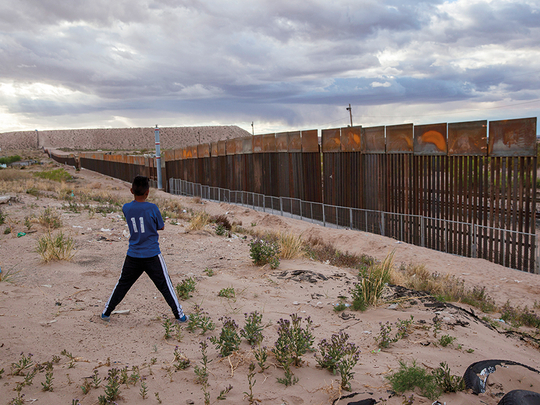
Mexico City: Mexico’s foreign relations secretary called US President Donald Trump’s plan to build a border wall an “unfriendly, hostile” act, adding Tuesday that it is a “bad idea” that will not accomplish anything.
Appearing before the international relations commission in the lower house of Congress, Videgaray unleashed uncharacteristically tough talk on Donald Trump’s demand that Mexico pay for building a border, telling lawmakers that Mexico would not put a peso towards the construction costs. He also called plans for fencing off the frontier “an absolute waste of money” and said Mexico would pursue legal measures if its borders were infringed upon by the wall.
“The wall is not part of any bilateral discussion nor should it be,” Videgaray said. “Under no scenario will we contribute economically to an action of this kind.”
The foreign minister’s comments come as the US president, who has insisted Mexico will pay for his campaign promise of building a border wall, pressures Congress to fund construction in the meantime. Trump had demanded Congress provide immediate funding for a border wall – even raising the possibility of a government shutdown – but appeared to be backing down on Tuesday.
Political analysts in Mexico saw Trump’s difficulties in persuading his own country’s Congress on key campaign promises – repealing and replacing Obamacare and finding funding for a border wall – as an opportunity for Mexican functionaries, who have preferred to not antagonize Trump, to take a tougher tone.
“Tough talk about the wall right now, right after Trump backing down, is low risk and comes without cost,” said Carlos Bravo Regidor, professor at the Centre for Research and Teaching of Economics in Mexico City. “[Trump’s] been all bark, no bite.”
Trump’s insistence on building a border wall has complicated Mexico-US relations, which had become close and cooperative on trade, commerce and security matters after decades of indifference and mutual distrust.
Mexican president Enrique Peña Nieto scrapped a trip to Washington in late January after Trump tweeted that his Mexican counterpart “should cancel” if a payment was not forthcoming. Both men subsequently spoke and agreed to not publicly discuss payment, though Trump took to Twitter again to advocate for building the border wall.
“The wall is going to get built and we’re setting record numbers in terms of stopping people from coming in and stopping drugs from coming in,” Trump said Tuesday, referring to a sharp decline in the number of undocumented migrants detained at the southern border since he took office.
Roughly one third of the 3,000 kilometres Mexico-US border is already blocked by a barrier, something Trump wants to complete and insists will stem the flow of migrants and stop drugs from entering the United States.
Security analysts have questioned Trump’s assertion the wall will stop illegal drugs since most illegal merchandise passes through legal ports of entry.
One member of Congress, Senator Ted Cruz, introduced the “El Chapo Act” – named for imprisoned Sinaloa cartel kingpin Joaquín Guzmán – on Tuesday, which would send any money forfeited by El Chapo or other drug bosses to build a border wall.
Guzmán, whose cartel smuggled tons of drugs through tunnels under the border and once escaped from prison via a tunnel connecting his cell with the outside world, was extradited on the eve of Trump’s 20 January inauguration and prosecutors are seeking the criminal forfeiture of $14 billion (Dh51 billion) in illicit proceeds.
Some in Mexico expressed skepticism with the prospect of “El Chapo” indirectly paying for a border barrier as the size of his fortune is pure speculation and presents the problem of “how to seize it” for the authorities, said Esteban Illades, a magazine editor in Mexico City.
There’s also the irony, he said, of “funding the wall with a law named after a man who can tunnel through anything”.












